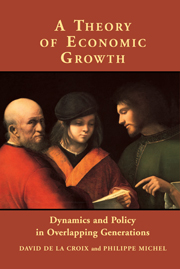5 - Further Issues
Published online by Cambridge University Press: 29 October 2009
Summary
This chapter offers a treatment of four important issues: altruism, education, inter-generational externalities, and general equilibrium in macroeconomics. The first three topics involve inter-generational linkages in one way or another; this is why they require the use of the overlapping generations model. Altruism implies bequests; education needs funding by older generations; inter-generational externalities model the inheritance of standard-of-living aspirations. The last topic studies the link between the overlapping generations model and the Arrow–Debreu approach to general equilibrium.
Altruism is an important topic in that it gives a motive to parents for leaving bequests to their children. In the real world, inter-generational resource transfers consist mainly of pensions (chapter 3), public debt (chapter 4), and private bequests. Section 5.1 explains how dynastic altruism provides a motive for bequest and studies the problem of the altruistic household. It then draws the consequences of altruism for pension and debt policy.
Parents’ influence on children is not limited to resource transfers; two other important influences are human capital spillovers (section 5.2) and taste spillovers (section 5.3). These two spillovers are in general responsible for two externalities: A positive one linked to the transmission of human capital from one generation to the other, and a negative one related to the inheritance of standard-of-living aspirations from the parents. The first one has given rise to many articles dealing with education as an engine of growth. They stress the idea that individual-specific human capital is increasing in the human capital of the previous generation and this can be responsible for sustained growth.
- Type
- Chapter
- Information
- A Theory of Economic GrowthDynamics and Policy in Overlapping Generations, pp. 238 - 304Publisher: Cambridge University PressPrint publication year: 2002



